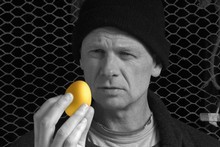Writer and director Stephen Sinclair had no creative restrictions on himself in his depiction of a self-exiled Russian film-maker’s obsession with his craft. Peter Calder writes.

Stephen Papps’ accent was so convincing that his Ukranian co-star would often speak Russian to him in between takes. Photo / Steve Latty
When Boris Bainov and Renata Pavlenko sailed into Huia in November 1999, they would not have imagined that they would one day come to occupy a small niche in the history of New Zealand cinema.
The Russian couple had crossed the notorious Manukau Bar – not to mention the Pacific Ocean, from Vladivostok via Vanuatu – more by good luck than good management, one suspects, since their craft was a 30-year-old, 8m aluminium lifeboat. Bainov had bought the craft, which a gobsmacked yachtie called a floating beer can, for a few dollars from a steamship company.
Bainov and Pavlenko called their boat the Fore Tiv, an obscure reference to the fact that Bainov was 44 when he finished it, but the screen version of it is called the Snark – or CHAPK in Russian’s Cyrillic characters. And the two adventurers on board in the film Russian Snark are entirely figments of film writer and director Stephen Sinclair’s imagination.
The co-writer, with Anthony McCarten, of the 1987 hit play Ladies’ Night, who also penned some of the second film in the Lord of the Rings trilogy, says the real story was “just a starting point, really”.
Article continues below
The quixotic nature of the sailors’ undertaking sparked the creation of a character, Misha, an experimental film-maker utterly and obsessively devoted to his art, who has to confront the cost of his obsession.
“I was interested in the dilemma of the artist,” says Sinclair, “that what’s good for the art may not necessarily be good for the person.”
It spoils little to say that Misha decides that it is better to be a good man than a good artist.
It seems like a strange thing for an artist to say, I suggest to Sinclair, given that the history of art is littered with people (mainly men) who did not reach the same conclusion.
“I’ve heard that Nabokov is a really nice person,” says Sinclair with a chuckle, “though he’s always cited as an exception to the rule. But Misha – I don’t want to give too much away – certainly takes it to the end of the line. He has to re-evaluate what actually is the point of what he does.”
The improbable story improbably gets under your skin, thanks to a charmingly eccentric performance by the lanky Papps, best known for his role as the loopy Firpo in Ian Mune’s film of The End of the Golden Weather. Among his other achievements, Papps speaks a good proportion of his lines in Russian and gives a fine impression of a native speaker.
His co-star, Elena Stejko, a Ukrainian, says she was “absolutely smitten by his devotion” and that he was so convincing that she often caught herself speaking to him in Russian between takes.
At times as oddball as its main character, Russian Snark was never the kind of project that would have attracted Film Commission support: the commission came in with some post-production funding and Creative New Zealand’s Screen Innovation Production Fund chipped in as well, but the film was predominantly self-funded.
“That was pretty liberating,” says Sinclair. “I didn’t have to get anyone to agree with my ideas or talk to committees. I could just be as eccentric and unusual as I wanted to be.”
The mixed tones of the result – a faintly tragic love story with a strong thread of satire – may not be for all tastes (one of our cinema’s few truly iconic images is deliciously lampooned) but Sinclair is unrepentant.
“Films like this are usually made by very serious artists who feel so strongly about their subject that humour might compromise their vision. I think that’s bullshit. There is nothing so serious that you can’t have humour in it as well.”
And he laments the pressure against the iconoclastic and offbeat in today’s tight funding environment.
“There is enormous pressure for everything to be mainstream and successful and the funders and networks are all second-guessing what they may be. But if your motivation is solely to get as many people as you can into the theatre, you are usually going to get it wrong anyway.
“My experience has been that if something really excites me, that’s the best chance it will interest other people.
I’ve tried to write stuff with a view to turning a dollar and the stuff that I come up with is really second-rate.”
By Peter Calder | Email Peter





 Russian Snark on DVD
Russian Snark on DVD